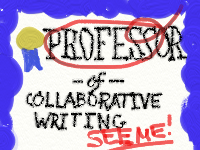Trust me

I’ve been asked what I think about Essay’s fall from grace. (If you’re too tired to follow that link, basically a really high-ranking Wikipedian who claimed to be a “tenured professor” was exposed as a fake.)
Well, if it ever comes to me having to verify that I “attend Stanford University in California, where I’m majoring in computer science,” I guess I can point them to the CS Department’s directory. :^)
More to the point, though, from the English Wikipedia community’s standpoint, Essjay’s real credentials shouldn’t matter at all, since the community is supposed to judge you on what you’ve done for the site and what sources you can dig up, not what you’ve done (or not) for academia. So the problem was more that it was inappropriate for Essay to boast credentials at all. Whenever he used his fake credentials as a means of winning arguments or swaying opinions, whether in the community or in his short-lived role as press contact, he hurt the project in the long run.
Obviously, faking credentials is immoral and unethical. However, if he had left his “degrees” at his user page and never brought them out in a factual discussion, it might’ve just been viewed as someone’s fancy, and no one would’ve cared. (Except of course the vandals, whom he says he was trying to hide his real identity from.) Similarly, it’s one thing to don a police officer’s uniform at a costume party, but quite another to lure a child into your car using your unauthorized uniform and badge, even though both are acts of impersonation.
Though I’m not entirely certain about some of this story’s details – neither is anyone else, apparently – Essjay should’ve come clean about his identity or at least removed the claims to professorship when he assumed an official position. (In this case, I regard an official position as one that is either paid or which represents Wikipedia in the outside world.) Given, doing so is only damage control, as it doesn’t negate the problem with having claimed these credentials in the first place, but at least Essay could say that he voluntarily revealed himself before someone forced him to. To some extent, he did, but he still held onto the notion that he could protect his identity from vandals by using a fake identity while holding an official position. You can’t have your cake, eat it, and then look like you’re starving. Hm, bad analogy.
I can tell you that, at least at the Vietnamese Wikipedia, someone trying to win an argument based on their credentials is probably going to be ignored. Maybe that’s because its (unofficial) press contact is an undergrad, and merely saying you’re a coterm is enough to one-up him. :^)
3/07/2007 @ 3:48 PM
Peter Rother
Could not a policy be put in place whereby using any credential (fake or authentic) would be disallowed? With credentials the whole objective of Wikipedia is downplayed since these fancy titles seem to breed finality in many topics. That is, an editor who looks at an edit by some Harvard law graduate, for example, is likely to overlook the edit and regard it as factual thus effectively setting it in stone. Trust can't be put on one person alone. I say put everyone on a level playing field and let it be discussed thoroughly.
While I do think having a substantial amount of credibility is necessary for an encyclopedia, I don't believe it does anything for any editor in the realm of Wikipedia. The true credibility lies in the references and especially those that have been discussed widely by true and identified scholars.
3/07/2007 @ 3:49 PM
Peter Rother
Could not a policy be put in place whereby using any credential (fake or authentic) would be disallowed? With credentials the whole objective of Wikipedia is downplayed since these fancy titles seem to breed finality in many topics. That is, an editor who looks at an edit by some Harvard law graduate, for example, is likely to overlook the edit and regard it as factual thus effectively setting it in stone. Trust can't be put on one person alone. I say put everyone on a level playing field and let it be discussed thoroughly.
While I do think having a substantial amount of credibility is necessary for an encyclopedia, I don't believe it does anything for any editor in the realm of Wikipedia. The true credibility lies in the references and especially those that have been discussed widely by true and identified scholars.